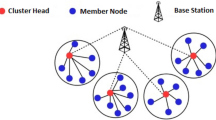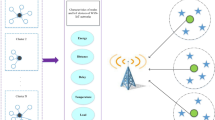Abstract
Due to recent advancements in mobile computing and communication technologies, mobile ad hoc computational Grids are emerging as a new computing paradigm, enabling innovative applications through sharing of computing resources among mobile devices without any pre-existing network infrastructure. Energy-efficient resource allocation is one of the key issues in mobile ad hoc computational Grids due to limited battery life of mobile nodes. To reduce energy consumption, we propose a hybrid power-based resource allocation scheme for allocation of interdependent tasks to nodes within mobile ad hoc computational Grid. The basic idea is to exploit dependencies and task type, and allocate interdependent tasks to nodes accessible at minimum transmission power. We also propose a power-based algorithm to search a group of closest nodes to allocate a set of interdependent tasks. Compared to traditional algorithms, complexity of proposed algorithm depends on number of transmission power levels rather than number of nodes within a Grid. The scheme is validated in a simulation environment using various workloads and parameters.
Similar content being viewed by others
References
Baker, M., Buyya, R., Laforenza, D.: Grids and Grid Technologies for Wire Area Distributed Computing. Software—Practice and Experience. Wiley, New York (2002)
Agrawal, D.P., Zeng, Q.A.: Introduction to Wireless and Mobile Systems. Thomson Brooks, San Francisco (2003)
Samad, T., Bay, J.S., Godbole, D.: Network-centric systems for military operations in urban terrain: the role of UAVs. Proc. IEEE 95(1), 92–107 (2007)
Balan, R.K., Satyanarayanan, M., Park, S.Y., Okoshi, T.: Tactics-based remote execution for mobile computing. In: Proceedings of MobiSys 2003: The 1st International Conference on Mobile systems, Applications and Services (2003)
Wireless Grids Working Paper I, http://wirelessgrids.net/people.html
Shah, S.C., Chauhdary, S.H., Bashir, A.K., Park, M.S.: A centralized location-based job scheduling algorithm for interdependent jobs in mobile ad hoc computational Grids. J. Appl. Sci. 10(3), 174–181 (2010)
McClatchey, R., Anjum, A., Stockinger, H., Ali, A., Willers, I., Thomas, M.: Data Intensive and Network Aware (DIANA) Grid scheduling. J. Grid Computing 5(1), 43–64 (2007)
Villela, D.: Minimizing the average completion time for concurrent Grid applications. J. Grid Computing 8(1), 47–59 (2010)
Chang, R.-S., Chang, J.-S., Lin, P.-S.: An ant algorithm for balanced job scheduling in Grids. Future Gener. Comput. Syst. 25, 20–27 (2009)
Yu, C., Marinescu, D.C.: Algorithms for divisible load scheduling of data-intensive applications. J. Grid Computing 8(1), 133–155 (2009)
Yang, J., Bai, Y., Qiu, Y.: A decentralized resource allocation policy in minigrid. Future Gener. Comput. Syst. 23, 359–366 (2007)
Desprez, F., Vernois, A.: Simultaneous scheduling of replication and computation for data-intensive applications on the Grid. J. Grid Computing 4(1), 19–31 (2006)
Shilve, S., Siegel, H.J., Maciejewski, A.A., Sugavanam, P., Banka, T., Castain, R., Chindam, K., Dussinger, S., Pichumani, P., Satyasekaran, P., Saylor, W., Sendek, D., Sousa, J., Sridharan, J., Velazco, J.: Static allocation of resources to communicating subtasks in a heterogeneous ad hoc Grid environment. J. Parallel Distrib. Comput. 66(4), 600–611 (2006)
Braun, T.D., Siegel, H.J., Maciejewski, A.A., Hong, Y.: Static resource allocation for heterogeneous computing environments with tasks having dependencies, priorities, deadlines, and multiple versions. J. Parallel Distrib. Comput. 68, 1504–1516 (2008)
Gonzalez-Castano, F., Vales-Alonso, J., Livny, M.: Condor Grid computing from mobile handheld devices. ACM SIGMOBILE Mobile Comput. Commun. Rev. 6(2), 18–27 (2002).
Millard, D., Woukeu, A., Tao, F.B., Davis, H.: Experiences with writing Grid clients for mobile devices. In: 1st International ELeGI Conference on Advanced Technology for Enhanced Learning, 14–16 March 2005, Vico Equense, (Napoli), Italy (2005)
Grabowski, P., Poznan, B.L.: Access from J2me-enabled Mobile Devices to Grid Services, pp. 61–704. Supercomputing and Networking Center, Noskowskiego Poznan, Poland
Fox, G., Ho, A., Wang, R., Chu, E., Kwan, I.: A collaborative sensor Grids framework. In: IEEE CTS, pp. 29–38 (2008)
Robinson, J.M., Frey, J.G., Stanford-Clark, A.J., Reynolds, A.D., Bedi, B.V.: Sensor networks and Grid middleware for laboratory monitoring. In: First International Conference on e-Science and Grid Computing (e-Science’05) (2005)
Shah, S.C., Kashif, A., Chauhdary, S.H., Jiehui, C., Park, M.-S.: Mobile ad hoc computational Grid for low constraint devices. In: ICFCC April 2009, Kuala Lumpur, Malaysia
Franke, H.A., Koch, F.L.: Grid-M: middleware to integrate mobile devices, sensors and Grid computing. In: Proceedings of the Third International Conference on Wireless and Mobile Communications (ICWMC’07) ©, IEEE (2007)
Tadeu, A., Gomes, A., et al.: DICHOTOMY: a resource discovery and scheduling protocol for multihop ad hoc mobile Grids. In: Seventh IEEE International Symposium on Cluster Computing and the Grid (CCGrid’07), IEEE (2007)
Chu, D.C., Humphrey, M.: Mobile OGSI.NET: Grid computing on mobile devices. In: Proceedings of the 5th IEEE/ACM International Workshop on Grid Computing, 08 November 2004. Pittsburgh, PA
Preetam, G., Nirmalya, R., Das, S.K.: Mobility-aware efficient job scheduling in mobile Grids. In: Seventh IEEE International Symposium on Cluster Computing and the Grid (CCGrid’07), IEEE Press (2007)
Hummel, K.A., Jelleschitz, G.: Robust de-centralized job scheduling approach for mobile peers in ad hoc Grids. In: Seventh IEEE International Symposium on Cluster Computing and the Grid (CCGrid’07), IEEE Computer Society (2007)
Selvi, V.V., Sharfraz, S., Parthasarathi, R.: Mobile ad hoc Grid using trace based mobility model. In: GPC 2007, LNCS 4459, pp 274–285 (2007)
Shilve, S., Siegel, H.J., Maciejewski, A.A., Sugavanam, P., Banka, T., Castain, R., Chindam, K., Dussinger, S., Pichumani, P., Satyasekaran, P., Saylor, W., Sendek, D., Sousa, J., Sridharan, J., Velazco, J.: Static allocation of resources to communicating subtasks in a heterogeneous ad hoc Grid environment. J. Parallel Distrib. Comput. 66(4), 600–611 (2006)
Li, C., Li, L.: Utility-based scheduling for Grid computing under constraints of energy budget and deadline. Comput. Stand. Interfaces (2009). doi:10.1016/j.csi.2008.12.004
Liu, H., Roeder, T., Walsh, K., Barr, R., Sirer, E.G.: Design and implementation of a single system image operating system for Ad Hoc networks. In: MobiSys ’05: Proceedings of the 3rd International Conference on Mobile systems, Applications, and Services, pp. 149–162. ISBN:1-931971-31-5 (2005)
El-Rewini, H., Ali, H.H., Lewis, T.: Task scheduling in multiprocessing systems. Computer 28(12), 27–37 (1995)
Paredes, R., Navarro, G.: Practical construction of k nearest neighbor graphs in metric spaces. Technical Report TR/DCC-2005-6, Dept. of Comp. Sci. Univ.
Potamias, M., Bonchi, F., Gionis, A., Kollios, G.: k-nearest neighbors in uncertain graphs. In: The Proceedings of the VLDB Endowment (PVLDB), vol. 3 (2010)
Callahan, P.: Optimal parallel all-nearest-neighbors using the well-separated pair decomposition. In: Proc. FOCS’93, pp. 332–340 (1993)
Callahan, P., Kosaraju, R.: A decomposition of multidimensional point sets with applications to k nearest neighbors and n body potential fields. JACM 42(1), 67–90 (1995)
Vaidya, P.: An O (n log n) algorithm for the all-nearest-neighbor problem. Discrete Comput. Geom. 4, 101–115 (1989)
Krunz, M., Muqattash, A., Lee, S.-J.: Transmission power control in wireless ad hoc networks: challenges, solutions, and open issues. IEEE Netw. 18(5), 8–14 (2004)
Kubisch, M., Karl, H., Wolisz, A., Zhong, L.C., Rabaey, J.: Distributed algorithms for transmission power control in wireless sensor networks. In: Wireless Communications and Networking (WCNC) (2003)
Lin, S., Zhang, J., Gu, L., He, T., Stankovic, J.: ATPC: adaptive transmission power control for wireless sensor networks. In: Proceedings of SenSys’06 (2006)
Kawadia, V., Kumar, P.R.: Principles and protocols for power control in Ad Hoc networks. IEEE J. Sel. Areas Commun. 1, 5–16 (2005)
Liu, X., Qiao, C., Wei, W., Yu, X., Wang, T., Hu, W., Guo, W., Wu, M.-Y.: Task scheduling and lightpath establishment in optical Grids. J. Lightwave Technol. 27(27), 1796–1805 (2009). doi:10.1109/JLT.2009.2020999
Author information
Authors and Affiliations
Corresponding author
Rights and permissions
About this article
Cite this article
Shah, S.C., Park, M. An Energy-Efficient Resource Allocation Scheme for Mobile Ad Hoc Computational Grids. J Grid Computing 9, 303–323 (2011). https://doi.org/10.1007/s10723-011-9188-x
Received:
Accepted:
Published:
Issue Date:
DOI: https://doi.org/10.1007/s10723-011-9188-x




